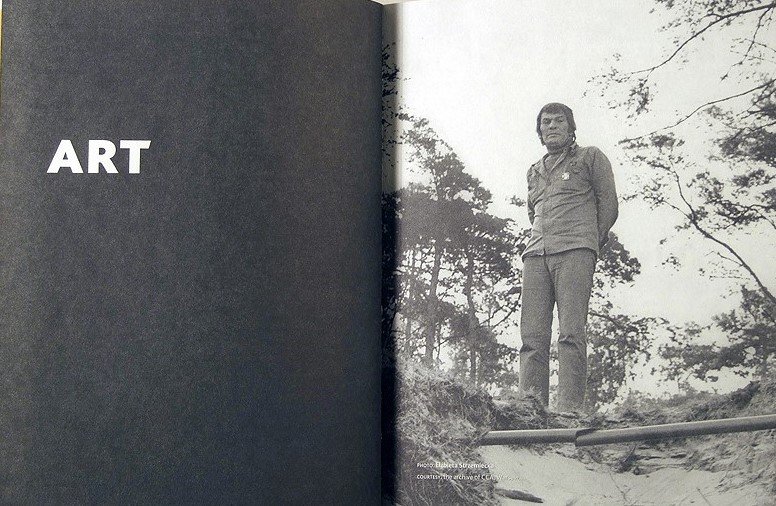
Book spread: Magdalena Ziolkowska, "Notes From the Future of Art – Selected Writings of Jerzy Ludwiński". Veenman Publishers, 2007.
On 10 December at 6pm, as part of its non-formal education programme, the LCCA Evening School, the Latvian Centre for Contemporary Art invites audiences to a talk by Polish curator Magdalena Ziółkowska ‘“Perhaps, even today, we do not deal with art”. On Jerzy Ludwiński’s philosophy of art’. The event will take place at the Latvian Centre for Contemporary Art, Alberta iela 13, and is free of charge.
“Perhaps, even today, we do not deal with art. We might have overlooked the moment when it transformed itself into something else, something which we cannot yet name. It is certain, however, that what we deal with offers greater possibilities.” So wrote Jerzy Ludwiński in his essay “Art in the Post-Artistic Era” in 1970. I would like to read this quite provocative sentence, which dates to more than 40 years ago, as a futuristic harbinger of various models of art institutions that have been declaring their involvement in important present-day issues. Today, galleries and centres for contemporary art have adjusted their programs to fit whatever contemplation, thought, analysis and wide discussion is required at any given moment. From this perspective, climate change, progressive environmental disaster and the irreversible degradation or depletion of the planet’s resources are the most pressing topics, requiring thought, concrete intervention and the care and awareness of our communities. Looking at the exhibiting strategies and practices of Jerzy Ludwiński (1930–2000) introduced in his theoretical concepts of the Museum of Current Art (1966), the Gallery of the Mona Lisa (since 1967) and the Centre for Artistic Research (1970), I would like to draw trajectories between the historical reforms and formats that existed within the institutional field from the late 1960s, when artists started to use new materials and technologies and reshaped the meaning of the artwork, and Ludwiński’s interest in calling for new categories and notions based on the continuous artistic process, including movements and activities from beyond the immediate field of art, such as protests and forms of opposition.
Magdalena Ziolkowska holds a PhD in art history, independent curator, graduate of the Curatorial Training Programme at de appel arts centre in Amsterdam (2006–07). In 2013, she received her doctoral degree for a dissertation on the concept of the Museum of Current Art in Wrocław by Jerzy Ludwiński and Polish postwar museology. From 2006 to 2010, she was a guest curator at the Van Abbemuseum in Eindhoven; she worked at Muzeum Sztuki in Łódź from 2008 to 2014, where she organised projects including Art Always Has Its Consequences (2008–10), Working Title: Archive (2008–2009), Sanja Iveković: Practice Makes the Master (2009), Eyes Looking for a Head to Inhabit (co-curator, 2011), and Hüseyin Bahri Alptekin: Incidents, Events, Circumstances, Accidents, Situations (co-curator, 2013–14) among others. She also co-curated Only to Melt, Trustingly, without Reproach (Škuc galerija, Ljubljana 2013/14). Since 2012, she has been a co-founder and vice president of the Andrzej Wróblewski Foundation. She co-curated Andrzej Wróblewski: Constantly Looking Ahead (National Museum, Krakow, 2012–13) and co-wrote of artist's monograph, Avoiding Intermediary States: Andrzej Wróblewski (1927–1957) (2014). In 2015–18, she was director of the Bunkier Sztuki Gallery of Contemporary Art in Krakow, where she curated Ines Doujak: Masterless Voices (2017), among other projects.
The LCCA Evening School is a series of conversations, talks, discussions and reading workshops devoted to current issues of contemporary art as well as exploration of the recent past, including the role of social, political and ideological contexts in culture. The LCCA Evening School takes place in the Latvian Centre for Contemporary Art, Alberta iela 13, and its events are free of charge. The project is supported by the State Culture Capital Foundation.